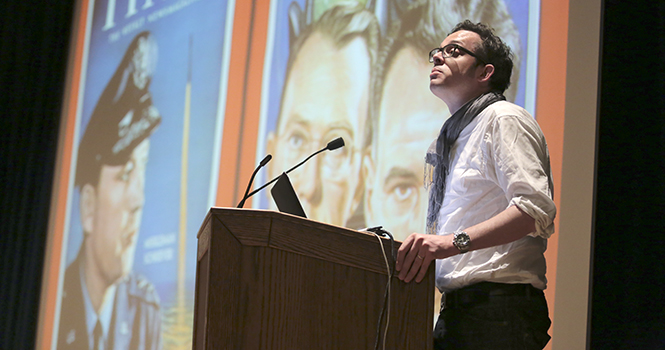Architect visits Kent State to talk about the spacesuit used on the Apollo
Nicholas de Monchaux, an assistant professor at Berkley, speaks at the KIVA on March 11, 2013. Monchaux spoke about how the NASA rocket programs of the 1960s affected modern urban design and development. Photo by Brian Smith.
Nicholas de Monchaux lectured at 7 p.m. Monday in the Kent State Kiva on his new book, Spacesuit: Fashioning Apollo, which discusses the melding of science and design to create the spacesuit.
“The suit was produced by the Playtex bra and girdle company,” Monchaux said. “And instead of being planned and engineered and assembled by men, the suit was stitched, crafted and fashioned by women.”
Monchaux said he began studying the spacesuit as a graduate student and throughout his research, he found that not much had been written on the spacesuits that were worn on the Apollo. He said during his lecture that this was probably due to gender and culture issues of the 1960s when the equipment for Apollo was being designed.
During the mid-twentieth century, Monchaux said NASA was looking for a hard-engineered spacesuit, which was based on a science fiction concept of man and machine. However, the spacesuits NASA used were soft, not hard.
“The A7L spacesuit worn on the moon by Neil Armstrong was instead a soft, multilayered assembly of fabric and latex,” Monchaux said.
NASA saw the Playtex suit as inferior and did not want to use it, but the astronauts preferred the designs after six weeks of trials. Monchaux said Playtex was so superior after the testing that there was no question of whether they should use the suits.
Monchaux said the gender and culture issues deeply embedded in this story are historically hidden. Even in museums and pictures of spacesuits, the failed hard-suits are more likely shown to audiences.
“We perversely privilege the failures,” Monchaux said, “but then again we almost always fail to see that which was most apparent. We ignore them at our peril.”
Monchaux is a Berkeley, Calif. based architect, historian and educator. Approximately 60 people attended his lecture. Audrey Burman, graduate in the architecture program, said she attended his lecture for one of her courses.
“It was interesting how he talked about fashioning what already existed,” she said. “I wouldn’t have thought they would willfully obscure success because it was made by women.”
Contact Anna Lemmon at [email protected].



